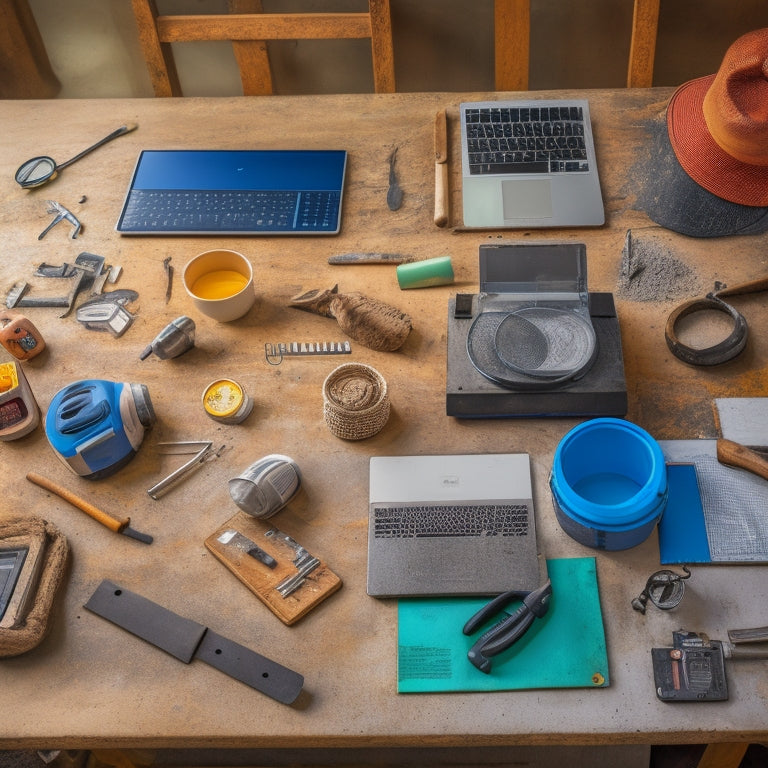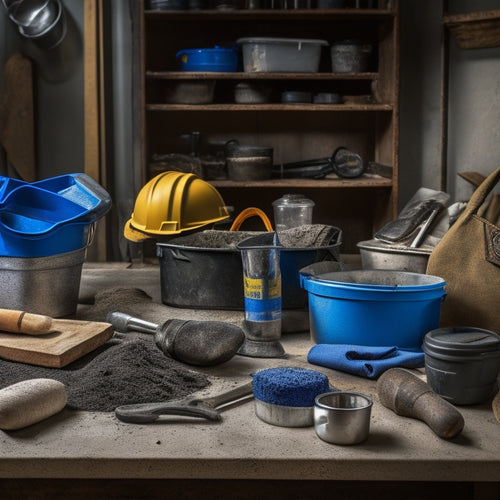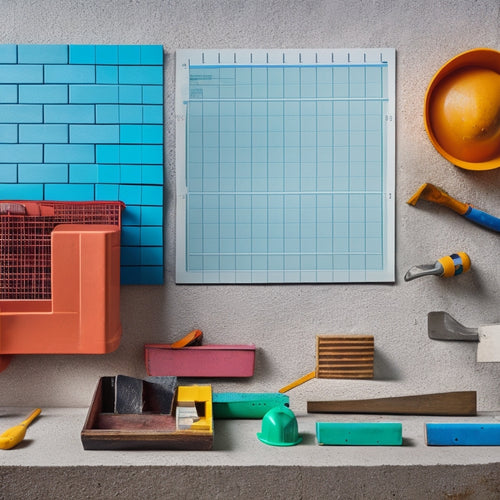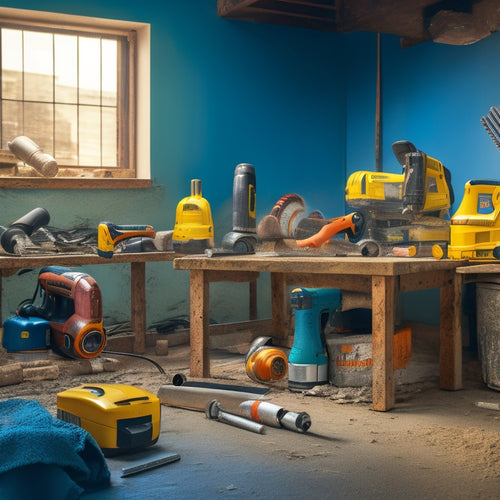
What to Look for When Buying Concrete Tools Online
Share
When buying concrete tools online, you'll want to evaluate products based on several key factors. First, prioritize tool quality and durability by looking for heavy-duty materials and inspecting tools frequently for signs of wear and tear. Research the brand's reputation through customer reviews, and ascertain the tool is compatible with your concrete type. Ergonomic design and handling are also essential, as well as safety features and certifications that meet rigorous standards. Additionally, compare prices and warranties, and review shipping and return policies before making a purchase. By considering these factors, you'll be well on your way to finding the right tools for your job - and there's more to explore to secure a successful purchase.
Key Takeaways
• Research the brand's reputation through customer reviews to ensure reliability and quality of concrete tools.
• Verify the tool's material quality, durability, and compatibility with the type of concrete being worked with.
• Look for ergonomic design features, such as contoured grips and balanced weight distribution, to reduce fatigue and improve handling.
• Ensure the tool meets rigorous safety standards, such as ANSI compliance, and has protective guard features in place.
• Compare prices among retailers, considering factors like discounts, shipping, and warranty support, to find the best value for your budget.
Tool Quality and Durability
When buying concrete tools online, you need to verify the products you're purchasing are built to last, as inferior tools can lead to subpar results, wasted time, and even safety hazards.
A vital aspect of confirming tool quality and durability is material selection. Look for tools made from high-grade, heavy-duty materials that can withstand the rigors of concrete work. For instance, tungsten carbide-tipped tools are ideal for drilling and cutting concrete, as they offer superior strength and resistance to wear.
Proper tool maintenance is also essential to extend the lifespan of your concrete tools. You should regularly clean and lubricate your tools to prevent corrosion and rust. Additionally, inspect your tools for signs of wear and tear, and replace them promptly if necessary.
Brand Reputation and Reviews
You can gauge a manufacturer's commitment to producing high-quality concrete tools by researching their brand reputation and reading reviews from other customers who've hands-on experience with their products. A reputable brand is more likely to stand behind their tools, offering warranties and reliable customer support.
Look for brands with a strong online presence, as they're more likely to be transparent about their products and services. Pay attention to customer feedback, both positive and negative, to get a well-rounded understanding of the brand's strengths and weaknesses. Brand loyalty is built on trust, and a manufacturer that values customer feedback is more likely to prioritize quality and performance.
When reading reviews, look for specific details about the tool's performance, durability, and ease of use. Be wary of generic, overly positive reviews that seem fake or lack specific details.
Compatibility With Concrete Type
The type of concrete you're working with is a crucial factor to evaluate when selecting concrete tools, as different tools are designed to effectively handle specific concrete types, such as high-strength, low-slump, or fiber-reinforced concrete. When buying concrete tools online, it's important to verify the tool you choose is compatible with the concrete mixture you're working with. Failure to do so can lead to tool damage, inefficient work, or even safety hazards.
| Concrete Type | Tool Compatibility |
|---|---|
| High-Strength | Requires tools with high-tensile strength, such as diamond-edged saw blades |
| Low-Slump | Needs tools with robust handles and durable materials to withstand heavy mixing |
| Fiber-Reinforced | Demands tools with specialized blades and mixing arms to handle fibers effectively |
| Colored Concrete | Requires tools with rust-resistant coatings to prevent color contamination |
| Rapid-Set | Needs tools with high-speed mixing capabilities to keep up with fast-setting concrete |
Ergonomic Design and Handling
When you're shopping for concrete tools online, you'll want to pay attention to ergonomic design and handling features that make a big difference in your productivity and comfort.
You'll be using these tools for extended periods, so it's essential to take into account factors like grip and balance, weight distribution, and handle design that fit comfortably in your hand.
Grip and Balance Matters
When buying concrete tools online, you need to pay attention to the grip and balance of the tool. Six key factors influence the grip and balance of concrete tools, including handle material, texture, and shape, as well as the distribution of weight and the positioning of controls.
Here's a breakdown of the key considerations:
| Grip Materials | Balance Techniques | Benefits |
|---|---|---|
| Rubber | Contoured handle | Improved grip, reduced fatigue |
| Foam | Offset handle | Better balance, increased control |
| Textured plastic | Weighted handle | Enhanced grip, reduced slipping |
| Ergonomic grip | Adjustable handle | Customized fit, improved balance |
| Grip tape | Balanced handle design | Additional grip, improved control |
When choosing a concrete tool, look for grip materials that provide a secure hold, and balance techniques that distribute weight evenly. A well-designed grip and balance can make a huge difference in your productivity and comfort on the job site. By considering these factors, you can select a tool that fits comfortably in your hand, reducing fatigue and improving your overall performance.
Tool Weight Distribution
You'll want to prioritize tools with ergonomic design and handling that evenly distribute weight, allowing you to maintain control and precision without straining your muscles. This is essential for efficient tool maintenance and overall performance. A well-balanced tool guarantees weight stability, reducing fatigue and enabling you to work for extended periods without compromising your technique.
When evaluating tool weight distribution, consider the following key factors:
-
Center of gravity: Look for tools with a center of gravity close to the handle, making them easier to maneuver and control.
-
Weight symmetry: Verify the tool's weight is evenly distributed on both sides of the handle to prevent uneven fatigue and strain.
-
Counterbalance design: Opt for tools with built-in counterbalances that offset the weight of the tool head, providing a more comfortable and controlled experience.
- Material selection: Choose tools made from lightweight yet durable materials that minimize weight without compromising strength and performance.
Comfortable Handle Design
Ergonomic design and handling play an essential role in reducing fatigue and discomfort, as they allow your hands to maintain a neutral position, minimizing strain on your wrists and fingers.
When buying concrete tools online, you should prioritize a comfortable handle design that promotes user comfort. Look for tools with handles made from materials that provide a secure grip, such as rubber or foam, which can absorb vibrations and reduce slippage. A contoured handle shape can also help to reduce fatigue by allowing your hand to rest naturally, reducing pressure points and strain.
Additionally, consider the handle's diameter and length, ensuring it fits comfortably in your hand. A well-designed handle can make a significant difference in your overall productivity and efficiency.
You'll be able to work for longer periods without experiencing discomfort or fatigue, allowing you to complete tasks more efficiently. By prioritizing ergonomic design and handling, you can enhance your overall user experience and get the most out of your concrete tools.
Safety Features and Certifications
When you're buying concrete tools online, you'll want to guarantee they meet rigorous safety standards.
You're looking for tools that not only get the job done but also protect you from harm.
As you shop, pay attention to certifications like ANSI compliance, ergonomic handle design, and protective guard features that can make all the difference in a safe working environment.
ANSI Compliance Standards
When shopping for concrete tools online, you need to verify that the products you're considering meet the necessary ANSI compliance standards.
Complying with ANSI standards is essential, as these regulations dictate the safety features and certifications required for concrete tools to guarantee safe operation and minimize the risk of accidents.
As you browse through online stores, look for tools that meet the following industry standards:
-
ANSI/ISEA 121-2018: This standard specifies the requirements for safety gloves, including those used in the concrete industry.
-
ANSI/ASSE Z87.1-2016: This standard outlines the requirements for eye and face protection, including safety glasses and goggles.
-
ANSI/ASSE A10.33-2011: This standard covers the safety requirements for concrete and masonry saws, including blade guards and safety features.
- ANSI/ASME B30.20-2018: This standard specifies the safety requirements for below-the-hook lifting devices, including those used in concrete construction.
Ergonomic Handle Design
Concrete tool handles, expertly designed with ergonomics in mind, can greatly reduce operator fatigue and discomfort, allowing you to work more efficiently and safely on your construction projects. A well-designed handle can distribute the weight of the tool evenly, reducing strain on your hands and wrists. Look for handles made from durable, high-quality materials that provide a comfortable grip, even in wet or slippery conditions.
When selecting a concrete tool online, consider the following ergonomic handle design features:
| Feature | Benefits |
|---|---|
| Contoured grip | Reduces fatigue and discomfort |
| Soft-touch materials | Provides a comfortable grip |
| Balanced weight distribution | Reduces strain on hands and wrists |
| Non-slip coatings | Improves grip in wet or slippery conditions |
| Adjustable handles | Accommodates different hand sizes and preferences |
Protective Guard Features
Your safety on the construction site depends on the protective guard features of your concrete tools, which should meet industry standards and certifications to prevent accidents and injuries. When buying concrete tools online, it's vital to look for protective guard features that guarantee your safety while working with powerful machinery.
Here are some key features to take into account:
-
Protective guard materials: Look for durable, high-quality materials that can withstand the rigors of construction work. Guards made from heavy-duty steel or aluminum are ideal.
-
Guard adjustment mechanisms: Confirm the guard can be easily adjusted to accommodate different tool sizes and angles. This feature is important for maximum safety and flexibility.
-
Certifications and compliance: Verify that the tool meets industry standards and regulations, such as OSHA and ANSI certifications.
- Visual inspection: Always inspect the tool's protective guard before purchase, looking for signs of wear, damage, or corrosion. A well-maintained guard is vital for your safety on the job site.
Price and Value Comparison
You'll need to scrutinize the prices of various online retailers to identify the best value for your money, as significant differences can exist between them. This involves more than just comparing prices; you'll need to evaluate the overall value each retailer offers. Look for online deals that include discounts, free shipping, or bundle offers that can help you stay within your budget planning.
Be cautious of extremely low prices, as they may indicate a lower-quality product or a retailer with poor customer service.
When comparing prices, make sure you're looking at the same product with the same features and specifications. Check the product description, reviews, and ratings to verify you're getting the best tool for your needs.
Don't sacrifice quality for a cheaper price; instead, focus on finding the best value that meets your budget and requirements. By taking the time to research and compare prices, you'll be able to find the concrete tool that provides the best return on your investment.
Warranty and Customer Support
Beyond comparing prices, it's crucial to investigate the warranty and customer support offered by online retailers, as these aspects can greatly impact your overall satisfaction with your concrete tool purchase. You want to guarantee that you're protected in case your tool malfunctions or breaks down prematurely.
When researching warranty and customer support, consider the following key factors:
-
Warranty terms: How long does the warranty last? What does it cover? Are there any conditions or limitations?
-
Customer service: How can you contact the retailer if you have an issue with your tool? Is customer support available 24/7 or only during limited hours? Are they responsive to your queries?
-
Return and exchange policies: Can you return or exchange a defective tool easily? Are there any restocking fees or other charges?
- Reviews and ratings: Check online reviews from other customers to get an idea of the retailer's customer service and warranty support.
Shipping and Return Policies
When purchasing concrete tools online, understanding the shipping and return policies is essential to avoiding unexpected delays and costs.
You'll want to know exactly how your tools will be shipped, how long it'll take to arrive, and what it'll cost you. Be sure to check if the seller offers international shipping, as this may impact your decision if you're located outside the country.
Also, familiarize yourself with the return process in case you're not satisfied with your purchase. Can you return items easily? Are there restocking fees? How long do you have to initiate a return? Knowing these details beforehand will save you headaches down the line.
Look for sellers that provide clear, concise shipping and return policies. If you can't find this information on their website, don't hesitate to reach out to their customer support.
Frequently Asked Questions
Can I Use Concrete Tools for Other Masonry or Construction Projects?
When tackling masonry or construction projects beyond concrete, you'll want to know if your tools can keep up.
The good news is that many concrete tools offer impressive masonry versatility, allowing you to adapt them for other tasks.
However, it's vital to check tool compatibility before diving in.
You'll find that some tools, like trowels and edgers, are more versatile than others, like specialized concrete mixers.
Research and understand the capabilities of your tools to guarantee you're getting the most out of your investment.
Are All Concrete Tools Suitable for Both DIY and Professional Use?
When it comes to concrete tools, you'll find that not all are created equal for both DIY and professional use.
While some tools can handle heavy-duty projects, others may not. You'll want to evaluate tool quality and read user reviews to determine if a tool is suitable for your needs.
Look for tools with durable materials, robust construction, and high-performance capabilities to guarantee they can handle the demands of your project.
Do Online Retailers Offer Bundle Deals or Discounts for Tool Sets?
You're flooded with options when shopping online, and it's like finding a needle in a haystack to get the best deal.
But, do online retailers offer bundle deals or discounts for tool sets? Yes, many online retailers offer bundle options that can save you a small fortune.
You'll often find discount availability on tool sets, especially from reputable brands.
Look for retailers that offer package deals or loyalty programs to get the most bang for your buck.
Can I Purchase Replacement Parts or Repair Services Online?
When you need to repair or replace a concrete tool, you'll want to know if online retailers can help.
Fortunately, many online sellers offer replacement part availability, so you can quickly get the exact component you need.
You'll also find online repair options, such as repair kits or mail-in services, to get your tool up and running again.
Are Online Tutorials or Instructional Guides Available for Tool Usage?
You're finally ready to release your inner concrete master, but wait, you're not exactly sure how to wield that fancy new tool. Don't worry, you're not alone!
Fortunately, online tutorials and instructional guides are just a click away. Look for video demonstrations that showcase the tool's capabilities and, more importantly, safety guidelines to guarantee you don't become a DIY disaster.
With these resources, you'll be well on your way to concrete domination!
Conclusion
You've done your research, weighed your options, and are ready to buy concrete tools online.
But, you might be thinking, 'What if I get stuck with low-quality tools or a brand that doesn't stand behind their products?'
Don't worry, by considering the factors outlined above, you'll be well-equipped to make an informed purchase.
Remember, a little extra time upfront can save you headaches and costs in the long run, ensuring you get the right tools for your concrete project.
Related Posts
-

5 Tools Needed for Quick Fix Concrete Mixing
You'll need five essential tools to tackle a quick fix concrete mixing project efficiently. First, you'll require a s...
-

Reinforcement Tools Checklist for Concrete Block Walls
You'll need a range of reinforcement materials, including horizontal and vertical rebar, fiber mesh, and anchor bolts...
-

Essential Power Tools for Concrete Block Construction
When building with concrete blocks, you'll need a range of power tools to cut, drill, mix, and finish the blocks to g...


